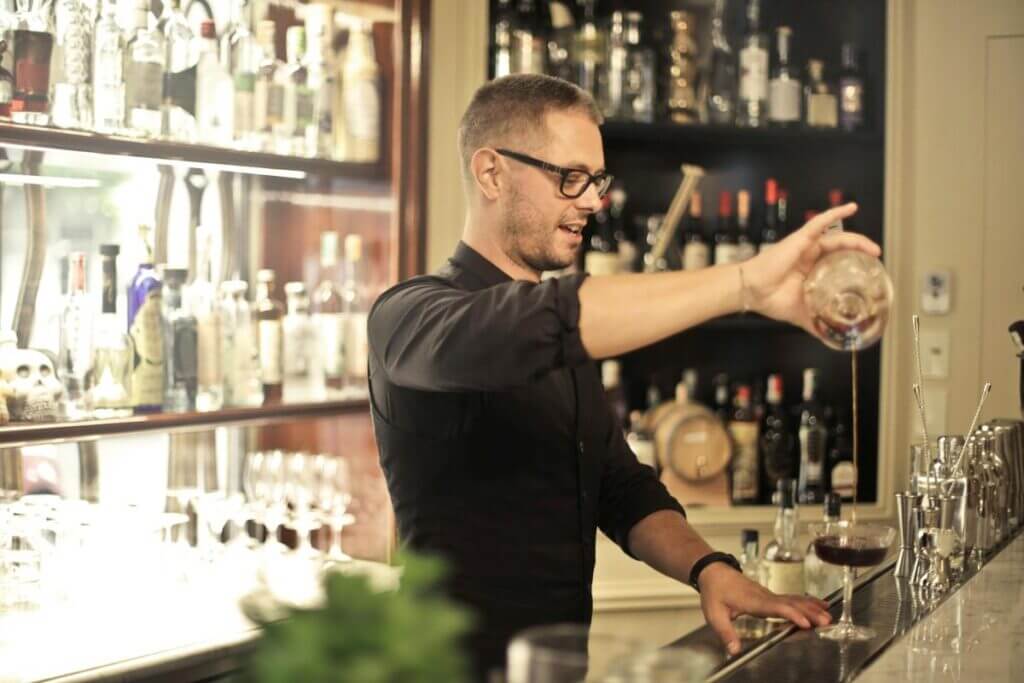What Bartenders Do
Bartenders stock and and prepare beverages garnishes, maintain ice, glasses, and other bar supplies. Bartenders also play a crucial role in the hospitality industry, often serving as the face of a bar or restaurant. Their responsibilities extend far beyond simply pouring drinks. Bartending is much more than just mixing drinks; it’s a blend of artistry, science, and hospitality.
In this comprehensive guide, we’ll delve into the multifaceted role of bartenders, exploring everything from customer service to mixology techniques. Below is a list of what bartenders do.

1. Master Mixologists: Crafting the Perfect Drink
Professional bartending requires deep technical expertise in drink preparation and mixology. Bartenders must master classic cocktail preparations while understanding the nuances of different spirit categories, from aged whiskeys to botanical gins. Their knowledge encompasses proper pouring techniques, precise measurements, and the art of building balanced cocktails.
Modern mixology demands both technical precision and creative innovation. Bartenders develop signature recipes that showcase their expertise while respecting classic foundations. They understand the chemistry behind different mixing methods, from proper dilution techniques to the importance of temperature control in cocktail preparation.
2. Customer Service Experts: Creating Memorable Experiences
Excellence in hospitality defines the professional bartender. They create welcoming environments where guests feel valued and understood. This involves reading customer preferences, making informed recommendations, and maintaining engaging conversations while efficiently managing service flow. The best bartenders transform casual visits into memorable experiences through their personality and professionalism.
The role demands sophisticated guest interaction skills. Bartenders must excel at managing multiple conversations while maintaining service efficiency. They handle special requests with grace, resolve concerns professionally, and build lasting relationships with regular customers. This combination of social skills and service expertise sets exceptional bartenders apart.
3. Beverage Knowledge: Educating and Entertaining Guests
Contemporary bartenders serve as beverage educators, possessing comprehensive knowledge of spirits, wines, and beers. They understand production methods, regional characteristics, and historical context of different beverages. This expertise allows them to guide guests through selections and enhance their appreciation of different drinks.
Their role as educators extends to conducting tastings and explaining the subtleties of different beverages. They share insights about drink history, production methods, and flavor profiles, enriching the guest experience through knowledge and storytelling. This educational component adds value to the service experience and helps build customer loyalty.
4. Bar Management: Maintaining Order Behind the Scenes
Successful bar operations require exceptional organizational and management skills. Bartenders maintain precise inventory control, manage stock levels, and ensure proper product rotation. They understand cost control principles and implement strategies to maximize profitability while maintaining service quality.
Financial acumen is crucial in modern bartending. Professionals must process transactions accurately, manage cash operations, and understand pricing strategies. They contribute to business success through careful cost control and waste reduction while maintaining high service standards.
5. Safety and Responsibility: Upholding Legal and Ethical Standards
Professional bartenders serve as guardians of responsible service. They maintain comprehensive knowledge of alcohol service regulations and implement strict standards for age verification and intoxication monitoring. Their role in maintaining safety and compliance is fundamental to establishing trust with both guests and management.
The position demands excellent judgment and decision-making skills, particularly in managing difficult situations. Bartenders must maintain composure while handling challenging circumstances, coordinate with security when necessary, and ensure proper documentation of incidents. This combination of authority and diplomacy helps maintain a safe, enjoyable environment.
6. Innovation and Creativity in Modern Bartending
Today’s bartending professionals push creative boundaries while respecting traditional techniques. They experiment with new ingredients, develop seasonal offerings, and create unique presentations that enhance the guest experience. Innovation in garnishing, presentation, and flavor combinations keeps their offerings fresh and exciting.
The modern bar program often incorporates sustainable practices and local ingredients, reflecting contemporary values. Bartenders develop signature drinks that showcase regional products and seasonal availability while maintaining profitability and service efficiency.
7. Professional Development and Industry Evolution
Career growth in bartending requires commitment to continuous learning. Professional bartenders stay current with industry trends, participate in competitions, and pursue advanced certifications. They network within the industry and contribute to the evolution of their craft through innovation and knowledge sharing.
The profession offers numerous advancement opportunities, from bar management to beverage program development. Many successful bartenders progress to consulting roles, brand ambassadorship, or venue ownership, building on their comprehensive industry experience.
Conclusion: The Future of Professional Bartending
The bartending profession continues to evolve, embracing new techniques and trends while maintaining its foundation in hospitality excellence. Modern bartenders combine traditional service values with contemporary skills, creating experiences that exceed guest expectations. Their role remains essential to the hospitality industry’s success, driving innovation and maintaining the highest standards of service and professionalism.
Whether crafting classic cocktails or developing innovative beverage programs, professional bartenders play a crucial role in shaping the future of hospitality. Their commitment to excellence, continuous learning, and guest satisfaction ensures the profession’s continued growth and evolution.
